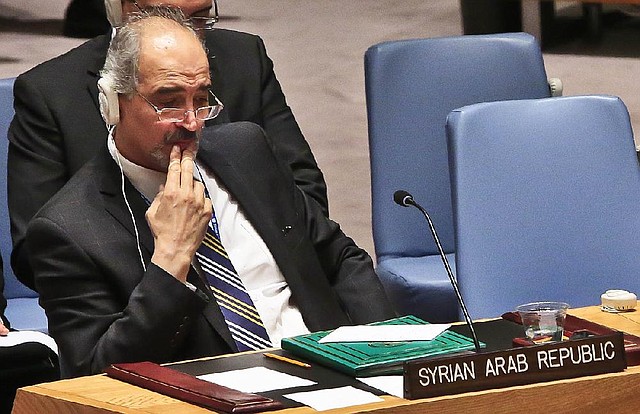Russia, China veto referring Syria to court
Syria U.N. ambassador Bashar Ja'afari listens after a U.N. Security Council vote on referring the Syrian crisis to the International Criminal Court for investigation of possible war crimes, Thursday, May 22, 2014. The resolution was vetoed with Russia and China, two of the council's permanent members, voting against the resolution. (AP Photo/Bebeto Matthews)
Friday, May 23, 2014
UNITED NATIONS -- Russia and China on Thursday vetoed a United Nations Security Council resolution referring the Syrian crisis to the International Criminal Court for investigation of possible war crimes, prompting angry responses from the proposal's supporters, who said the two countries should be ashamed.
This is the fourth time Russia and China have used their veto powers as permanent council members to deflect action against the government of President Bashar Assad. The 13 other council members voted in favor of the resolution.
More than 60 countries signed on to support the French-drafted measure, demonstrating strong international backing for justice in the conflict, which activists say has sent millions fleeing and killed more than 160,000.
The resolution would have referred Syria's crisis, now in its fourth year, to the world's permanent war-crimes tribunal for investigation of possible war crimes and crimes against humanity, without specifically targeting either the government or the opposition.
Before the vote, French Ambassador Gerard Araud warned, "A veto would cover up all crimes. It would be vetoing justice."
But Russian Ambassador Vitaly Churkin walked into the council meeting with a smile, telling reporters, "I'm going to be boringly predictable."
Churkin, who had called the vote a French "publicity stunt" that would hurt efforts to find a political solution to a crisis, lashed out at France again on Thursday. He asked why France was damaging the unity of the five veto-wielding permanent members, who had agreed on earlier resolutions to eliminate Syria's chemical weapons and on improving delivery of humanitarian aid.
China's deputy U.N. ambassador, Wang Min, added that a referral to the International Criminal Court won't lead to an early resumption of peace talks.
Frustration has soared as the international community struggles to find a solution to the war, deliver humanitarian aid to almost 3.5 million Syrians in need and end impunity. Attempts at peace talks are at a standstill, leading the joint U.N.-Arab League envoy who tried to broker them to resign.
"Sadly, because of the decision by the Russian Federation to back the Syrian regime no matter what it does, the Syrian people will not see justice today," U.S. Ambassador Samantha Power said.
"It is to Russia and China's shame that they have chosen to block efforts to achieve justice for the Syrian people," British Ambassador Mark Lyall Grant said.
Syria is not a party to the Rome Statute, which established the International Criminal Court, so the only way it can be referred to The Hague-based tribunal is by the Security Council.
Syrian U.N. Ambassador Bashar Ja'afari, who lobbied countries not to support the resolution, told the council that it was based on "nothing but mendacious allegations and fabricated lies."
The U.S., Britain and France vowed to keep pursing justice despite Thursday's defeat.
France's Araud said Australia, Luxembourg and Jordan are working on a draft resolution that would "further" the Syria humanitarian resolution approved earlier this year, which has largely failed to get aid to millions in need.
The U.N. secretary-general, however, said Thursday that the U.N. is poised to help get long-awaited humanitarian aid across borders into Syria.
"We are ready to put in place arrangements at key border and line crossings to facilitate, improve and monitor access," a report by Ban Ki-Moon states, including at crossings "currently outside the government's effective control."
In Syria on Thursday, government tanks backed by air power rolled into the grounds of a sprawling prison in the northern city Aleppo, breaking a year-long rebel siege and allowing Assad's forces to close in on a nearby rebel command center.
The Syrian army has made gains around the capital, Damascus, the seat of Assad's power, and in the center of the country. It has now turned its attention to the north and rebel-held parts of the south, where it seeks to advance ahead of the June 3 presidential vote dismissed by Western powers as a sham.
Footage broadcast on Syria state TV showed soldiers in Aleppo celebrating inside the prison grounds, speaking to a reporter as inmates cheered and flashed victory signs in their cells.
Also Thursday, the global chemical-weapons watchdog said the last 100 metric tons of Syria's declared stockpile of precursors for poison gas and nerve agents have been packed and are ready for transport, though the Assad regime said it's too risky to move them.
Syria is already well behind schedule in removing its stockpile of some 1,300 tons of chemicals that it declared to the Organization for the Prohibition of Chemical Weapons last year. All the chemicals were supposed to have been destroyed by the end of June, but that deadline now appears out of reach. The U.S. says it needs 60 days to destroy hundreds of tons of highly toxic chemicals on board a specially equipped ship.
Information for this article was contributed by Zeina Karam, John Heilprin, Bassem Mroue, Ryan Lucas and Yasmine Saker of The Associated Press.
A Section on 05/23/2014

